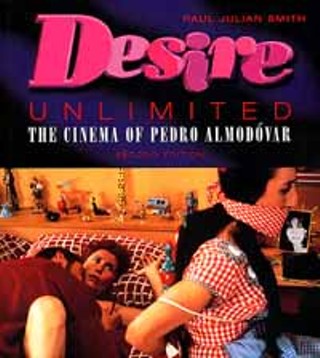True Hollywood Stories
Books About Film
By David Garza, Fri., Dec. 15, 2000

Desire Unlimited: The Cinema of Pedro Almodóvar
by Paul Julian SmithVerso Books, 217 pp., $20 (paper)
If Pedro Almodóvar weren't so chic, he might be a genius. Only a genius, after all, could legitimately explore issues like sexuality, desire, and art by repeatedly using men who are women, and women who poison men, and loons who wave guns, and punks who urinate on housewives who happen to love it. Perhaps it is this reliance on lowbrow comedy tactics that delayed the popular respect Almodóvar has deserved for most of his 20-year career. But with his so-beautiful-it-hurts film All About My Mother winning last year's Oscar for Best Foreign Film, the flamboyant and unbeatably intelligent auteur has begun to get his props. In Desire Unlimited, Paul Julian Smith, a film critic and professor at Cambridge University, spends more than 200 pages setting up a solid argument in defense of the director's often-controversial work: "The conspicuous frivolity of Almodóvar's cinema is intimately linked to serious concerns which have often gone unnoticed ..."
What might some of these more serious concerns be? To have a fuller sense of these issues, it is important to realize that Almodóvar's first feature Pepi, Luci, Bom began production in 1978 and was released in 1980, only a few years after the end of General Francisco Franco's hyper-moral dictatorship. In the film's opening sequence, a policeman catches the not-so-young virgin Pepi growing marijuana. She agrees to offer him sex to avoid being prosecuted, provided that their intercourse be exclusively anal. Her plan, after all, is to make money later in life by auctioning off her virginity to the highest bidder. Later in the film, the sexual stakes are raised even higher when a group of friends mocks the democratic process by holding a penis contest called "General Erections." The Catholic nation of Spain could not have been prepared for a director as lewd or as unbelievably talented as Almodóvar, and that may be the reason that his comparatively profound filmic studies of civil liberties, interpersonal relationships, and identity-formation were so long misunderstood as nothing more than kitsch.
Also consider that simply by putting such brazen thoughts onto a screen in the Spain of 1980, Almodóvar risked not only his artistic reputation but his well-being. Earlier in the century, the more radical forces in the country had shown poet Federico Garcia Lorca exactly what they thought of artists who explored sexuality from what Smith calls a "feminine code" -- he was shot. Smith also argues that Almodóvar's development as an artist and as a critic of society is astounding considering his lack of training and the state of cinema in Spain: "It is little short of a miracle that Almodóvar should have achieved such commercial success with the odds so stacked against him."
What Smith tends to overlook in his examination is that the consistent force behind Almodóvar's genius isn't simply a sentience for feminine thought or a talent for visual composition -- it's his writing. During a particularly memorable scene in All About My Mother, the hilarious transvestite prostitute La Agrado tells her colorful life story to a theatre audience. Defending her excessive plastic surgery, she explains that people become more sincere when they become more like the persons they dream of being. That wonderful sentiment seems a great defense of Almodóvar's own writing -- often criticized for being superficial and glossy, it has actually grown over time to become more intelligent, more personal, more universal. If, in the end, there's still a swing of the hips and heart to be broken, then perhaps he's a genius after all.








